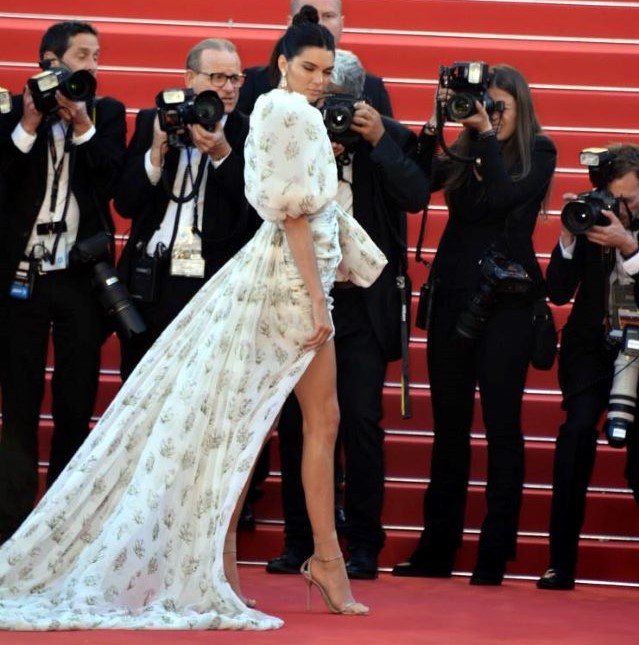
Kendall Jenner at the 2017 Cannes Film Festival. Photo by Georges Biard via Creative Commons-SA 3.0, Link
It may be tempting to bundle celebrities like Kim Kardashian, Justin Bieber and Taylor Swift in the same category as lesser-known social media influencers. But the two groups are different, even if both have plenty of followers
Celebrity endorsements and sponsored influencer content have similarities and may overlap at times, but the two strategies entail different advantages and disadvantages. It’s crucial to understand those differences to develop effective PR or social media marketing campaigns.
“Treating influencer marketing like a small-scale celebrity endorsement, or expecting a celebrity’s endorsement to have an impact like an influencer’s, is like using a wrench to hammer a nail or a hammer to undo a bolt,” explains Grey Geppert, US Content Manager at Swizzle Global, in Convince & Convert.
Although celebrities can be called influencers – after all, they’re supposed to influence people to purchase products — it’s probably best to think of those famous people as celebrities and others with large social media followings as influencers.
Celebrities can deliver substantial reach and boost brand awareness. They have gigantic social media followings that can run into the millions. In addition, since media outlets cover their daily activities, they can generate significant earned media mentions. They are especially effective in fashion, beauty and travel. But many marketers argue that influencer marketing holds several advantages over celebrity endorsements.
Expertise. Famous singers understand music, but they don’t need to be in expert in nutrition to endorse a food product. Influencers usually have expertise in the products they mention. That expertise has earned them the respect and trust of their audience. A startup or brand that’s focusing on a niche will benefit more by working with an influencer in the niche, be it high-tech gadgets, race cars or parenting.
Audience relationships. Celebrity endorsements on social media are more akin to traditional television advertising than influencer marketing. Marketers hire them to reach a large, broad market — but don’t expect them to interact with fans in a meaningful way. Celebrity engagement rates are generally lower than those of influencers.
Seeing the #ad or #sponsored hashtag, followers generally understand that they’re viewing a sponsored endorsement. They consider the celebrity as a conduit for the brand’s message.
On the other hand, top-notch influencers who specialize in a niche answer questions from followers and communicate with them in a back-and-forth exchange. Because of that constant dialogue, they understand their audiences. “Thus, they have established credible relationships with their audiences giving them a significant advantage during marketing campaigns,” says Reed Duchscher, president of Night Media.
Content creation. When endorsing products, celebrities relay the message that the brand produces. Influencers create their own content, writing blog posts, taking photos or shooting videos. As content creation experts, they prefer creative strategies and heartfelt opinions over simply regurgitating the brand’s message. Some marketers make the mistake of scripting an influencer’s content, which leads to mediocre content and damages the relationship. Even when sponsoring content, savvy brands only set general guidelines and grant influencers significant creative leeway.
For example, food blogger Christina Russell (Body Rebooted) created a piece of content to promote Bob’s Red Mill, points out digital marketing consultant Shane Barker. The fitness expert created a recipe using one of the brand’s ingredients, provided her readers with tips to create the same dish, and then promoted the brand’s giveaway campaign. “She’s the one who controlled the content and messaging for the sponsored post,” Barker says.
Cost. Celebrities, of course, are expensive. Those with more than 7 million Instagram followers may charge as much as $150,000 for one sponsored post, according to The Economist.
While large brands may believe the exposure and additional brand awareness is worth the cost, the fees are out of reach for most small companies and startups. Bloggers and social media influencers are more affordable. Although they have less reach, micro-influencers typically charge about $500 or less.
Advantages of Celebrities
In addition to reaching large numbers of followers, celebrities offer other key advantages over influencers, explains Alison Hill, founder and partner at CurrentPR.
Because they are followed by the media, celebrities can produce substantial earned media mentions – greatly extending their reach. They also can draw large crowds to live events. Most influencers go unnoticed when they appear in person.
Celebrities can improve the brand’s image. “People just assume there must be something great about it if the celebrity is affiliated with it,” Hill says.
They’re more likely to stay on message. People like actors and TV personalities are skilled at delivering lines. Some influencers may act impulsively and post off-brand or risqué content.
In addition, influencers are not always more cost-effective than celebrities. Their limited reach and influence may not justify their requested fees. Some marketers now prefer contracts with influencers based on results, such as leads or sales, not just exposure.
Bottom Line: It’s proper and appropriate for PR and marketing professionals to treat celebrities and influencers differently. While both celebrity endorsements and influencer marketing can produce results, savvy brands understand the differences between the strategies.
William J. Comcowich founded and served as CEO of CyberAlert LLC, the predecessor of Glean.info. He is currently serving as Interim CEO and member of the Board of Directors. Glean.info provides customized media monitoring, media measurement and analytics solutions across all types of traditional and social media.




